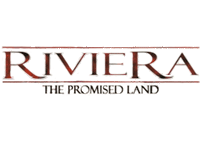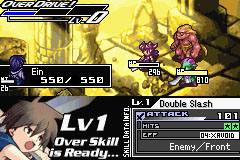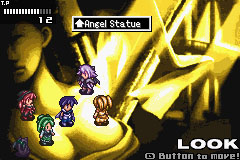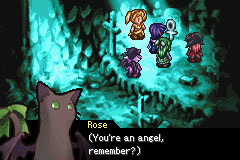|
|

|
BATTLE SYSTEM
|

|
INTERACTION
|

|
ORIGINALITY
|

|
STORY
|

|
MUSIC & SOUND
|

|
VISUALS
|

|
CHALLENGE
|
Medium Easy
|
COMPLETION TIME
|
15-30
|
|
OVERALL
4.0/5
|
Rating definitions
|
|
|
When the world was to end, the gods sacrificed themselves to create Grim Angels, and save the world from Ragnarok. Asgard and Utgard, heaven and hell, battled it out a thousand years ago. Now, Utgard threatens to rise up again in Riviera: The Promised Land. Ein has been tasked with wiping out Riviera to prevent the ressurrection of Utgard, however the Sprites have taken up residence within Riviera and destroying it would also mean killing them. Mixing a unique dungeon-style exploration system with a relationship system, Riviera is a game that may not seem anything special at first but when put together with a great storyline and a challenging battle system, there's little bad to say about the experience that GBA users will get from Atlus' latest contribution to the handheld.
The battle system may not have many unique parts to it but as a whole, brought together, it's unlike anything else. Battles begin by choosing a formation: two party members in front, one in back, or vice versa. Then three party members from a total possible of five are selected for each spot, and the main character Ein must be part of each battle. Once that is completed, four items are chosen to take into battle; the player must choose carefully as these are the only four items the characters will have access to, and they each have a finite number of uses. Once an item has gone through all of its uses, it shatters. There is unfortunately no way to repair weapons, but there is a constant flow of items to acquire (mostly by opening treasure chests), so it is more likely that the player will have too many items than too few. Each character has a wait bar which must time down before their next action can take place. Once it is their turn they must choose an item to use; the same item may have a different use for each member, such as a sword being a swing or a stab, while others are universal, such as every member eating a piece of fruit for healing purposes. Not every character is proficient with every weapon, and may simply get the option to "throw" it, usually at low accuracy. Those who have some proficiency with the weapon may earn experience with it, and learn a skill. Learning a skill may take as few as three uses while others may take as many as eight. This is how the characters level up as there is no experience in the traditional sense. Once a character has enough experience to master a skill they not only learn a special Overdrive skill but their stats will also increase. This aspect of levelling combined with the durability of the items would normally cause a dilemma: who gets to use what item if there's only a small amount of uses before it breaks. This is solved neatly by Practice Mode, which can be entered at any time. While in practice mode, the characters fight monsters one dungeon lower than they are currently in. Items do not lose their durability during this mode of combat, thus meaning that a variety of characters can gain experience with it and thus become stronger in regular battles.
 Checking An Overdrive
Checking An Overdrive
|
|
As damage is dealt and received, a bar above the characters called the 'overdrive bar' will fill. This is what is required to perform the characters' Overdrive skills. The meter can be filled up to level 3, and different Overdrives use either one, two, or all three levels of the bar; there is also the rare excalibur class attack, which only Grim Angels learn. These attacks will vary in power based on how full the meter was when used (it can be used at any time regardless of how full the meter is), but are so powerful that when one is used, it shatters the Overdrive bar and no further Overdrives can be used for that battle. Enemies also have a similar bar which fills as damage is done to them; as time passes this bar degrades downwards, though the Overdrive bar does not share this characteristic. Once it is filled past the Rage line they can use Rage attacks and when the bar is used completely enemies can access their Max attacks, which can be quite devastating to a party though it completely drains their bar. As enemies are killed - and most fights involve two or more enemies - part of their bar will be permanately filled, usually meaning more Rage and Max attacks as the fight goes on longer. If the party is wiped, the player has the option of restarting where they last saved, or simply restarting the particular battle from scratch. The enemy party will be weakened and the Overdrive bar will be partially filled, but this does affect which grade can be attained for the battle.
At the end of each fight, the player is given a ranking based on their performance in battle. Ranging from D up to the coveted S, this grading is based on whether any characters died, how few turns the fight took, and what the finishing blow was. Using Overdrives, especially an EXL class Overdrive, is the best way to acquire the best rankings. The better the ranking, the more rewards handed out; TP, or trigger points, are doled out based on ranking with S ranking receiving 4 or 5 points. Whether an item will be rewarded is also based on rank. Trigger Points are then used to explore the dungeons Ein and his companions visit. Dungeons are explored in individual rooms which link together to make areas. There are several areas per dungeon, and the player can save between areas as needed. There is also an option to suspend at any time, including during battle, which is a necessity in a handheld title. Overall, the battle system has a lot to offer for those tired of the same old battle systems with the same old ATB system.
 Look Mode
Look Mode
|
|
It's little surprise to hear that Riviera was originally a WonderSwan Color game when considering the graphics. Done in a classy anime style, sweatdrops included at no additional charge, it is easy to tell how the characters are feeling just by what they are doing and the expressions on their face portraits. The graphics as a whole are done in bright colors, even the darker areas such as graveyards and underground caverns are never too daunting. The music adds a suitable atmosphere and does an excellent job of setting up excitement, but the minimalistic voice acting - found only in battles - could have been easily cut out and the game wouldn't have lost much of anything.
Though a relatively easy game, Riviera does throw the players a few surprises. While no outright power levelling can be done, using Practice with every item that is acquired will definitely give your characters a leading edge. Being able to restart battles with the enemy weakened also means those who haven't spent enough time acquiring new skills will usually be able to defeat monsters and bosses eventually, though it's not the best course of action nor the quickest way. Puzzles scattered throughout the game can be as simple as pressing a button at the right time to a complicated series of button matching, and can be for something as simple as opening a chest, to continuing forward in some dungeons. Though some puzzles require a bit of strategy, most are simple and fun and just require a bit of time. To complete the game, a player can be looking at a leisurely 15 to 20 hours for their first playthrough, and subsequent jaunts to be slightly less, at around 10 to 15 hours. The game does change depending upon which aspects the player investigates and which woman he chooses to be the nicest to, so multiple playthroughs are definitely something that an RPGamer can look forward to with Riviera.
The menu system is laid out in a very efficient manner. Overdrives are accessed by a simple left press on the directional pad, information on the battle progress such as the enemies' strategies as well as the suspend option can be found by just hitting the Select button. As Ein goes through dungeons, there are two modes he can be swapped between. Move is pretty obvious - it allows the player to choose where to move Ein to next. By pressing B, however, Ein changes to Look mode, where TP is finally used. Some items in white text can be simply looked at, with no Trigger Points required; most items will be in red text with the number of TP required to examine it, one apiece. These could be nothing, reveal additional parts of the storyline, reward items via a chest or other option, or be an event item to pick up. Discovering unique items, circumstances, and overcoming some obstacles will reward the player with points. These points are added up at the end of each of the seven chapters, and will determine how many TP Ein will have at the beginning of the next chapter. The game is rather heavy in text, both random as well as the storyline itself, and it is very well translated, with only a couple small mistakes. These small errors don't in any way actually hurt the gameplay, and the game does shine in this area.
 "Oops, I Forgot!"
"Oops, I Forgot!"
|
|
Riviera is an interesting mix of old standards and fresh ideas. While the battle system is essentially an ATB, gone are the usual array of stats; STR or strength is both a character's physical attack power and their defense against such attacks, and MAG or magic is the same for magical attacks. The two remaining stats are VIT and HP and determine how much damage a character takes before falling. Thus, a newer twist on an old idea can be had. While items being used to level up characters' abilities and stats is not a new idea, it is rarely combined together with the weapons having a finite amount of uses. Riviera simply gives off a feel that no other game really does, and thus it is difficult to compare it to any other title. The story will, however, seem somewhat familiar to those that have played Valkyrie Profile as Riviera pulls a lot of references from Norse mythology, especially those legends revolving around the end of the world. The story also evolves at an excellent pace, with no dungeon being simply too long and no story arc ever being tiring. The story also changes slightly depending upon which girl(s) are sweet on Ein, so playing the game multiple times is even more of a rewarding experience.
There are few games which truly find a way to excel in a number of aspects while not being dragged down in others; Riviera stands up as an excellent example of innovation in an RPG, especially considering it can be played for a few minutes or a few hours in a sitting, simply depending upon how much time an RPGamer has for their on-the-go gaming. While the GBA often gets overlooked as a system rich in RPGs, what it may not have in quantity, it certainly has in quality. This is certainly a title that would be an excellent addition to anyone's collection, even if they normally do not play RPGs, as it is simple to pick up, fast to learn, and enjoyable the entire way through. It is a game that should not be passed up if possible.
Review Archives
|









